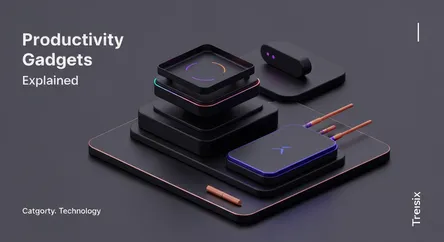Technology
Productivity Gadgets Explained

Discover productivity gadgets designed to boost focus, streamline workflows, and minimize distractions in our increasingly digital world.
What is it?
Productivity gadgets are specialized electronic devices or tools designed to help individuals enhance their focus, manage their time more effectively, and streamline daily tasks. Unlike general-purpose gadgets like smartphones, these items serve a specific function aimed at reducing distractions and improving efficiency. Examples range from smart notebooks that digitize handwritten notes and time-tracking cubes that simplify task management, to noise-canceling headphones that create a focused work environment and smart mugs that keep coffee at the perfect temperature for hours. The core purpose is to solve a common productivity problem with a dedicated technological solution.
Why is it trending?
The trend towards productivity gadgets is fueled by the significant shift to remote and hybrid work models. As professional and personal spaces merge, individuals are actively seeking ways to create structure and minimize distractions at home. The constant digital noise from notifications and multitasking has created a demand for tools that promote 'deep work'. Furthermore, there's a growing cultural emphasis on personal optimization and wellness, where working smarter, not harder, is the ultimate goal. These gadgets are marketed as tangible solutions to combat burnout and reclaim control over one's time and attention.
How does it affect people?
For many, productivity gadgets positively impact daily life by fostering better habits and a more organized workflow. They can lead to tangible increases in output, reduced stress levels, and a greater sense of accomplishment. By automating or simplifying routine tasks, these tools free up mental energy for more complex, creative thinking. However, there can be a downside. An over-reliance on gadgets can sometimes lead to 'tech-clutter,' adding another layer of complexity to manage. The key is to strategically adopt tools that solve a genuine problem rather than collecting devices for the sake of novelty, ensuring they serve their purpose of simplifying, not complicating, life.